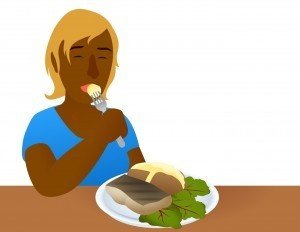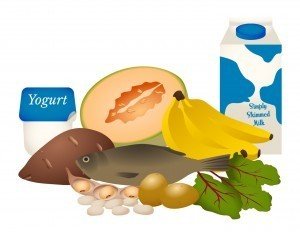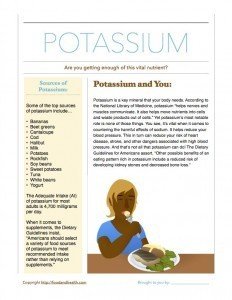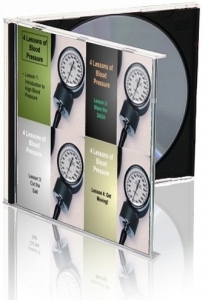Potassium and the Dietary Guidelines
 The Dietary Guidelines for Americans insist, "Because consumption of vegetables, fruits, whole grains, milk and milk products, and seafood is lower than recommended, intake by Americans of some nutrients is low enough to be of public health concern. These are potassium, dietary fiber, calcium, and vitamin D." What are these nutrients? Why are they so important to good health? How can people increase their intakes of them?Those are the questions that the Dietary Guidelines Nutrients of Concern series has set out to answer. We've discussed dietary fiber and calcium already, so let's move on to potassium.Potassium is a key mineral that your body needs in order to function. According to the National Library of Medicine, potassium "helps nerves and muscles communicate. It also helps move nutrients into cells and waste products out of cells." Potassium is important for building proteins, breaking down carbohydrates, building muscle, facilitating healthy growth, and much more. Yet potassium's most notable role is none of those things. You see, it's vital when it comes to countering the harmful effects of sodium consumption. The Dietary Guidelines for Americans assert, "Dietary potassium can lower blood pressure by blunting the adverse effects of sodium on blood pressure." This in turn can reduce your risk of heart disease, stroke, and other dangers associated with high blood pressure. Of course, that's not all that potassium can do. The Dietary Guidelines for Americans continue, "Other possible benefits of an eating pattern rich in potassium include a reduced risk of developing kidney stones and decreased bone loss."So where can you get this marvelous nutrient?
The Dietary Guidelines for Americans insist, "Because consumption of vegetables, fruits, whole grains, milk and milk products, and seafood is lower than recommended, intake by Americans of some nutrients is low enough to be of public health concern. These are potassium, dietary fiber, calcium, and vitamin D." What are these nutrients? Why are they so important to good health? How can people increase their intakes of them?Those are the questions that the Dietary Guidelines Nutrients of Concern series has set out to answer. We've discussed dietary fiber and calcium already, so let's move on to potassium.Potassium is a key mineral that your body needs in order to function. According to the National Library of Medicine, potassium "helps nerves and muscles communicate. It also helps move nutrients into cells and waste products out of cells." Potassium is important for building proteins, breaking down carbohydrates, building muscle, facilitating healthy growth, and much more. Yet potassium's most notable role is none of those things. You see, it's vital when it comes to countering the harmful effects of sodium consumption. The Dietary Guidelines for Americans assert, "Dietary potassium can lower blood pressure by blunting the adverse effects of sodium on blood pressure." This in turn can reduce your risk of heart disease, stroke, and other dangers associated with high blood pressure. Of course, that's not all that potassium can do. The Dietary Guidelines for Americans continue, "Other possible benefits of an eating pattern rich in potassium include a reduced risk of developing kidney stones and decreased bone loss."So where can you get this marvelous nutrient? Some of the top sources of potassium include...
Some of the top sources of potassium include...
- Bananas
- Beet greens
- Cantaloupe
- Cod
- Halibut
- Milk
- Potatoes
- Rockfish
- Soy beans
- Sweet potatoes
- Tuna
- White beans
- Yogurt
The Dietary Guidelines for Americans maintain "The Adequate Intake (AI) for potassium for adults is 4,700 mg per day," but most people don't get nearly that much. Too little potassium in your diet can have seriously bad health effects. For example, by not consuming enough potassium, you can raise your blood pressure and increase your risk of hypertension (source). Moreover, according to the National Library of Medicine, "A low blood level of potassium is called hypokalemia. It can cause weak muscles, abnormal heart rhythms, and a [...] rise in blood pressure." Protect your health by getting enough potassium, every day.Oh, and when it comes to supplements, the Dietary Guidelines assert, "Americans should select a variety of food sources of potassium to meet recommended intake rather than relying on supplements."How will you reach the AI for potassium today?Here's a free printable PDF handout with the highlights of today's post. And here are some of the top potassium resources from the Nutrition Education Store. We're here to help you look your very best, right now!
And here are some of the top potassium resources from the Nutrition Education Store. We're here to help you look your very best, right now!




